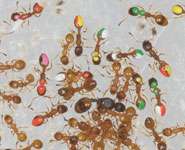Ants on the brain

(PhysOrg.com) -- Colonies of social insects such as ants and bees could collectively make decisions using mechanisms similar to those used in primate brains, according to new research from the University of Bristol.
Animals constantly make decisions, such as whether a predator is approaching or where they should establish a new home. These kinds of problems require a trade-off between speed and accuracy when making such decisions, and confront organisms at all levels of biological complexity.
By analysing models from neuroscience and insect socio-biology, Dr James Marshall from the University of Bristol and colleagues show how colonies of house-hunting social insects could collectively compromise between the speed and accuracy of decision-making, using mechanisms similar to those used by neurons in the primate brain.
Others have previously speculated that insect colonies and brains might work in similar ways, such as Douglas Hofstadter in his Pulitzer-Prize winning book Gödel, Escher, Bach, but the Bristol study is the first to theoretically link the two.
Dr Marshall said: “The analysis we present represents the first step in establishing a common theoretical framework for the study of decision-making in biological systems. This framework should prove applicable to diverse biological systems at many levels of biological complexity, including humans.”
The results, published in the Journal of the Royal Society Interface, draw the first formal parallels between decision-making circuits in the primate visual cortex and social insect colonies. Both ‘systems’ make choices that reflect an optimal compromise between speed and accuracy of decision-making, by assessing competing streams of evidence.
Neurons in the brain and social insect colonies must reach a point at which a decision is initiated. Notwithstanding their impressive individual abilities, neurons are simple in comparison with individually sophisticated social insects. Nevertheless, at a simple level, both systems can implement robust, efficient decisions, regardless of how sophisticated their individual components are.
Provided by University of Bristol
















